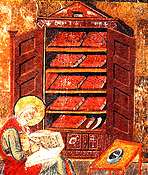Lectio Divina as School of Prayer
| Table of Contents |
 1. Scripture, school of life
1. Scripture, school of life
2. What does “lectio divina” mean?
3. Reading?
4. Scripture as the sole “Rule” of the monk
5. The hermeneutics of the desert
6. Sons of the Church of Egypt and of Alexandria
7. Hermeneutic circle
8. Understanding Scripture
9. Pre-comprehension
10.Word of the Ancients
11. The modern notion of lectio divina
12. Conclusion and Credits
Note: This is the translation of a talk given at the Centre Saint-Louis-des-Français, in Rome, in November 7, 1995. It is presented here in an indexed format for reflective study.
The vocation of Antony, as it is described for us by Athanasius in his Life of Antony, is well known. One day the young Antony, who had been brought up in a Christian family of the church of Alexandria (or at least in the region of Alexandria), and who had therefore heard the Scriptures read since his childhood, enters the church and is particularly struck by the text of Scripture that he hears read: the story of the call of the rich young man: “If you would be perfect, go, sell what you have and give to the poor, and come, follow me; you will have a treasure in heaven”. (Matt. 19: 21; Vit. Ant. 2)
Antony has undoubtedly heard this text many times before; but this day the message strikes him most forcibly, and he receives it as a personal call. He therefore answers the call, sells the family property – which is quite considerable – and distributes the profits of the sale to the poor of the village, keeping just enough to support his younger sister for whom he is responsible.
A little later, on entering the church once again, he hears another Gospel text which affects him as much as the first: “Take no thought for the morrow” (Matt. 6: 34; Ant.3). This text too goes straight to his heart as a personal call. And so he entrusts his sister to a community of virgins, (such communities have been long in existence), rids himself of everything that remains to him and undertakes the ascetical life near his village, under the guidance of the ascetics of the region.
This story shows clearly the importance and the meaning that Scripture had among the Fathers of the Desert. It was first of all a school of life. And because it was a school of life, it was also a school of prayer for the men and women who desired to make of their life a continual prayer, as Scripture demanded of them.
The Fathers of the Desert wished to carry out faithfully in their lives all the precepts of Scripture. And, in the Scriptures, the first concrete precept they found on the frequency of prayer was not that they ought not to pray at this or that hour of the day or night, but that they ought to pray without ceasing.
Athanasius writes of Antony: (Vit. Ant. 3):
“He worked with his hands, having heard that he who is idle, let him not eat (2 Thes. 3,10). And he spent what he made partly for bread, and partly on those in need. He prayed constantly, since he learned that it is necessary to pray unceasingly in private. For he paid such close attention to what was read that nothing from Scripture did he fail to take in — rather he grasped everything, and in him the memory took the place of books”.
We should notice at once in this text of Athanasius, that continual prayer is accompanied by other activities, in particular work, and also the expression Ahe paid such close attention to what was read.
Obviously, we cannot speak of Scripture as a school of prayer among the Fathers of the Desert without reference to the two admirable Conferences which Cassian devoted explicitly to prayer, both attributed to Abba Isaac, the 9th and 10th.
The fundamental principle is given at once at the beginning of Conf. 9: “The whole aim of the monk and the perfection of the heart consists in an uninterrupted perseverance in prayer”. And Isaac explains that all the rest of the monastic life, ascesis and the practice of the virtues has no meaning or reason unless it leads to this end.

Leave a Reply